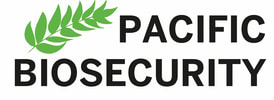|
Our Pacific Biosecurity initiative began in 2013, when we saw an increasing need for invasive ant management in the Pacific. Our work has evolved over time and and our primary focus now is on preventing the arrival, establishment and spread of invasive species, that is, biosecurity.
Pacific Biosecurity was established as a not-for-profit consultancy with the assistance of Viclink Limited (now Wellington Univentures), the commercialisation arm of Te Herenga Waka - Victoria University of Wellington in New Zealand. Our focus initially was on invasive ants. Ants have a history of establishing on Pacific Islands and reaching high abundance that causes dramatic changes to island biodiversity and the Pacific way of life. The threats to Pacific countries from invasive ants are increasing and likely to keep increasing over the next decades as these species spread. We are most concerned about spread of the little fire ant (also known as the electric ant) across the Pacific, and the potential for red imported fire ant to establish in Pacific island countries and territories. |
|
Pacific Biosecurity staff have been working on the research and management of invasive ants in the Pacific for more than 15 years.
Since 2013 we have contributed to invasive species management planning and capability building in many countries and territories in the region including. We have also developed standard tools and protocols for use throughout the region. Read more about our work here. We collaborate with regional organisations and in-country partners to enhance resilience and well-being through plant pest/invasive species management, primarily through supporting better biosecurity. Pacific Biosecurity was a founding member of the Pacific Regional Invasive Species Management Support Service (PRISMSS) and led the Protect our Islands programme. Our research outputs include collaborative peer-reviewed articles in international publications on invasive species ecology, impacts and management. |

